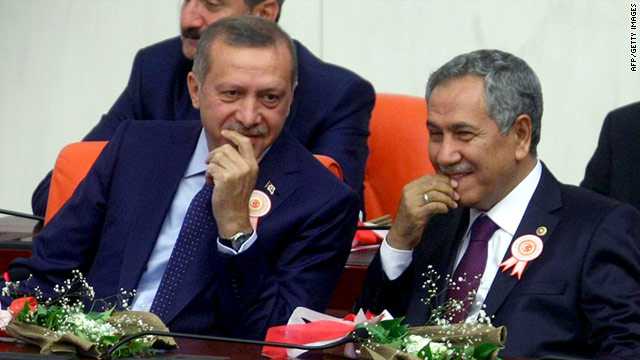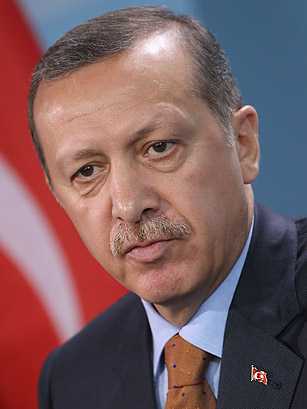By Ivan Watson and Gul Tuysuz, CNN
June 29, 2011 — Updated 1019 GMT (1819 HKT)
Turkey’s Prime Minister Recep Tayyip Erdogan (left) chats with Bulent Arinc during the swearing-in ceremony in parliament.
STORY HIGHLIGHTS
* Kurds, secularists were upset that several newly elected candidates were barred
* Kurdish lawmakers gathered in Diyarbakir instead of Ankara
* Two CHP members won elections on theiparty’s ballots from jail
RELATED TOPICS
* Turkey
* Turkish Politics
* Elections and Voting

Istanbul, Turkey (CNN) — Opposition boycotts marred the swearing-in ceremony of Turkey’s newly elected parliament on Tuesday.
The contentious session took place less than three weeks after Turkey’s incumbent Justice and Development Party, or AKP, won a resounding victory in national elections.
Led by two-term prime minister Recep Tayyip Erdogan, the party captured 327 seats in the 550-member body.
But the main Kurdish nationalist party and the largest secularist opposition party both objected after they saw several of their newly elected candidates barred from entering parliament.
More than 30 lawmakers from the Kurdish Peace and Democracy Party (BDP) boycotted Tuesday’s session.
They protested a decision by Turkey’s electoral board last week, which disqualified Kurdish candidate Hatip Dicle for “not meeting the requirements for being elected into parliament.”
The board cited Dicle’s 20-month prison sentence after he was convicted of “making propaganda for a terrorist organization,” Turkish official-speak for the separatist rebel group known as the Kurdistan Workers’ Party, or PKK.
The electoral board replaced the disqualified Kurdish candidate with the runner-up, a member of the ruling political party. The replacement AKP candidate was sworn into parliament on Tuesday.
Meanwhile, Kurdish lawmakers protested by gathering hundreds of miles away from the capital, Ankara, in the southeastern city of Diyarbakir on Tuesday.
“To show that we do not approve this intervention in democratic politics, we will continue our ‘not going to parliament’ approach until a solution can be found,” said Gulten Kisanak, one of the Kurdish party’s parliament members, in a phone call with CNN.
Lawmakers from the much larger Republican People’s Party, or CHP, attended the parliament meeting in the Turkish capital. But almost all of the CHP parliament members symbolically protested, by refusing to participate in the swearing-in ceremony.
We “will not be a part of a group who do not allow elected parliamentarians to take the oath,” said CHP leader Kemal Kilicdaroglu on Tuesday.
“With this principle and belief in democracy, we as CHP parliamentarians will not take the oath until the right of those who have been elected to take the oath is restored.”
Kilicdaroglu referred to two CHP members who won elections on the party’s ballot from jail, where they are awaiting trial as suspects in a sprawling investigation into an alleged coup to overthrow the Turkish government.
The inauspicious opening of parliament could complicate prime minister Erdogan’s much-publicized plans to rewrite Turkey’s constitution. Erdogan will need support from two-thirds of the sitting lawmakers, at least 330 members of the 550-person body, to take a new draft of the constitution to a popular referendum.
The dispute also highlights Turkey’s long-simmering ethnic conflict. More than 30,000 people, mostly Kurds, have been killed during fighting between the PKK and the Turkish state since the early 1980s.
On Sunday, tear gas wafted through the heart of the commercial capital of Istanbul after police clashed with Kurdish activists.
And on Monday, a Turkish soldier was killed and three troops wounded in a suspected PKK attack in near the eastern border city of Van, the semi-official Anatolian Agency reported.
via Opposition lawmakers in Turkey boycott swearing-in ceremony – CNN.com.
 Recep Tayyip Erdogan
Recep Tayyip Erdogan
